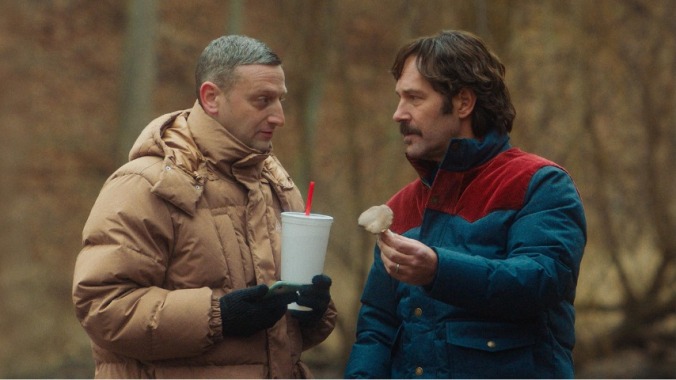Tim Robinson Takes on the Male Loneliness Epidemic in ‘Friendship’
It might be a fool's errand trying to find deeper meaning in this absurd and circus-like film, but here I am, ready to be that fool.
Photo: A24 EntertainmentMovies
AUSTIN, Texas—I forget how it entered the lexicon, but in recent years, the term “male loneliness epidemic”—an epidemic of alienated, disgruntled adult men who have no friends, feel rejected by women, and are dissatisfied with their lives—is everywhere. I tend to roll my eyes at it because I don’t think anyone, regardless of gender, is particularly happy right now, and at the very least, men generally don’t have to fear being harassed or potentially assaulted the moment they step outside. But I digress. The point is, a lot of fuss is being made about lonely men. Enter Andrew DeYoung’s Friendship, starring Tim Robinson and Paul Rudd, an unsettling contribution to the horror-comedy genre, and an absurd and astute examination of said male loneliness epidemic. “This is why guys shouldn’t have friends!” Robinson’s character declares at one point. It’s effectively the thesis of Friendship.
The film follows what Deadline aptly labels the “dark bromance” between Robinson’s Craig, a middle-aged suburban dad and self-described “lone wolf” who is the most classic Tim Robinson bit imaginable, and Rudd’s Austin, the achingly cool and beloved local weatherman. Friendship first premiered at the Toronto International Film Festival in December and screened at SXSW this week. Within the first 10 minutes of the Tuesday screening I attended, I seriously worried I wasn’t going to hear any of the film because of the uproarious audience laughter every time Robinson uttered a word or made a gesture.
Friendship makes it immediately clear Craig doesn’t exactly love his life. He works an exaggeratedly corporate marketing job at a company whose goal, as he describes to Austin, is to design products that rewire people’s brains and compel addiction. He ignores his wife’s (Kate Mara as Tammy) needs, as we learn when she reveals that not only is she one-year cancer-free, but she sometimes worries she’ll never orgasm again. Craig responds by telling us he has no problem orgasming.
-

-

-

-

-

-

-

-

-

-

-

-

-

-

-

-

-

-

-

-

-

-

-

-

-

-

-

-

-

-

-

-

-

-

-

-

-

-

-

-








































